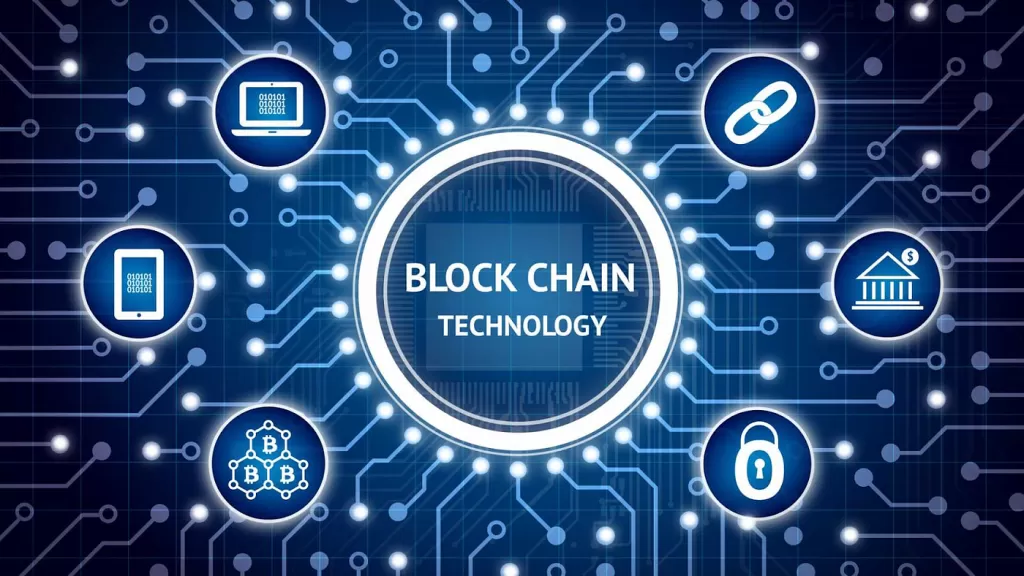Written By:
Scott McAuley
Scott is the IT Director of Texas Management Group, and has been in the IT industry for 25 years.
Did you know that blockchain is more than just a technology for finance? Its influence is expanding rapidly. Market experts predict the blockchain market will grow to $39.7 billion by 2025. This projected growth highlights the technology’s potential to transform many sectors.
Let’s take a closer look at how blockchain is influencing industries not connected to finance. Prepare to learn about its impact on supply chains, making them more traceable and efficient. Get ready to grasp how it can make voting more secure and transparent.
Let’s dive into how this innovative technology is changing the way business and society function.
Key Takeaways
- Blockchain technology’s market is projected to grow to $39.7 billion by 2025, indicating its transformative potential across various industries beyond finance, such as supply chains and voting systems.
- Blockchain improves supply chain efficiency by providing transparency and traceability, enabling businesses to track products from origin to consumer, thereby enhancing authenticity and trust.
- Blockchain ensures secure and transparent voting by creating immutable records of votes, reducing the risk of fraud, and enhancing electoral process integrity through decentralized ledgers.
- Blockchain eliminates intermediaries by leveraging decentralized networks, enhancing data integrity and security, and enabling direct peer-to-peer transactions, resulting in cost savings and increased efficiency.
- Despite its benefits, blockchain faces challenges such as regulatory uncertainty, energy consumption, and data privacy concerns, requiring ongoing efforts to maximize its potential impact across industries.
Table of Contents
What is Blockchain Technology?

Blockchain technology is a decentralized ledger system that records transactions across a network of computers, ensuring data integrity and security. Unlike centralized systems, blockchain relies on a distributed network of nodes, eliminating the need for intermediaries and enhancing transparency.
Each transaction is encrypted and linked to the previous one, creating an immutable chain of records. This cryptographic security makes altering data virtually impossible, bolstering trust among users.
Blockchain utilizes consensus mechanisms, like Proof of Work (PoW) or Proof of Stake (PoS), to validate transactions collaboratively. This ensures that all network participants agree on the data’s validity before adding it to the chain.
By providing a secure, transparent, and tamper-proof way of recording transactions, blockchain technology extends beyond financial applications, revolutionizing data management in various industries.
Any successfully validated transaction becomes an undeniable part of the blockchain. It marks an entry that cannot be changed, reflecting a clear transaction chronicle. This immutability is key to blockchain’s success, ensuring its trustworthiness and protection against manipulation.
Where is Blockchain Technology Commonly Used?
Blockchain technology is revolutionizing various industries, but it is most prominently used in the finance sector, particularly in the realm of cryptocurrencies.
When you think of blockchain, the first thing that probably comes to mind is Bitcoin or other cryptocurrencies. This is because blockchain serves as the underlying technology for these digital currencies.
In this context, blockchain acts as a decentralized ledger, recording all transactions across a network of computers. This ensures that the transaction history is immutable and transparent, making it nearly impossible to alter past transactions without altering all subsequent blocks.
Beyond cryptocurrencies, blockchain technology is making significant inroads into broader financial services. You will find blockchain being used to streamline processes such as cross-border payments, which have traditionally been slow and costly.
Blockchain enables faster, cheaper, and more secure transactions by eliminating the need for intermediaries.
For example, in international money transfers, blockchain can significantly reduce the time it takes for funds to be sent and received, as well as lower the associated fees. This ability to facilitate more efficient and transparent transactions is why blockchain continues to gain traction in the finance sector.
How Does Blockchain Technology Work?
Blockchain technology functions on a decentralized peer-to-peer network. In this network, every participant can view and add to a common ledger of transactions. This ledger is structured in a series of blocks, each block holding a series of verified transactions. When a new transaction occurs, it’s shared with the entire network for verification.
To safeguard the blockchain’s integrity, consensus algorithms are vital. These algorithms, like proof-of-work and proof-of-stake, guide network members in agreeing on transaction validity and ledger status. In proof-of-work, mining nodes engage in solving intricate math problems to append blocks. Conversely, in proof-of-stake, the network chooses validators based on their network investment.
Once verified, a transaction is unchangeable. It firmly joins the blockchain as a secure section of it. Each block connects to its predecessor through cryptographic means – creating a chain that’s both secure and tamper-proof. This setup guarantees that any recorded transaction can’t be altered without full network agreement.
Blockchain identity management ensures user identity privacy and security. By using cryptographic keys and digital signatures, user interactions with the network stay secure yet private. Public keys act as anonymous identifiers, whereas private keys verify transaction signatures and asset ownership.
| Consensus Algorithm | Description |
|---|---|
| Proof-of-Work (PoW) | Miners strive to solve complex puzzles to validate transactions and participate in adding blocks to the network. The first successful miner gets rewarded with cryptocurrency. |
| Proof-of-Stake (PoS) | Validators get chosen based on their network ownership. Having more tokens increases a validator’s chance of checking transactions and receiving rewards. |
| Delegated Proof-of-Stake (DPoS) | Here, token holders pick delegates responsible for confirming transactions and keeping the network going. These delegates receive rewards, but they risk their reputation if they engage in malpractice. |
| Practical Byzantine Fault Tolerance (PBFT) | It aims at overcoming byzantine faults, where a few nodes may behave wrongly or stop working. PBFT ensures the network can still agree, even with such issues. |
The decentralized aspect of blockchain technology abolishes the requirement for middlemen and central control. This promotes direct, secure, and efficient transacting among peers. The result is a cost-saving, trust-wide distribution benefits the network.
7 Key Components of Blockchain Technology
Blockchain technology has transformed the way we store data, conduct transactions, and ensure security. Essentially, it consists of various elements that interact to form a decentralized, transparent, and unchangeable structure. These elements are vital for understanding the many ways in which blockchain can be utilized.
Now, let’s explore the seven key components that underpin blockchain technology:
| Component | Description |
|---|---|
| Blocks | Digital containers that store transaction data, timestamps, and unique identifiers called hashes |
| Decentralization | Distributed network of nodes, resistant to single points of failure |
| Distributed Ledger | Shared, transparent, and tamper-proof record of all transactions |
| Consensus Mechanisms | Protocols that govern how nodes reach agreement on the validity of transactions |
| Cryptographic Hash Functions | Functions that produce a fixed-size output (hash) to ensure data integrity |
| Smart Contracts | Self-executing computer programs that automatically enforce agreement terms |
| Public/Private Key Encryption | Encryption mechanism that ensures security and privacy of digital assets |
1. Blocks
At the foundation of any blockchain lies the concept of blocks. These are digital containers that house transaction data, timestamps, and unique hashes. Blocks are chained together, securing the data’s integrity and immutability. Such a structure links each block to the next, forming an unbroken sequence.
2. Decentralization
Central to blockchain’s innovation is its decentralized nature. It operates without a central controlling authority, spreading out data across a network of nodes. This distribution avoids single points of failure and ensures no one entity governs the information, promoting resilience and open access.
3. Distributed Ledger
The distributed ledger is essentially a shared record of all transactions within the blockchain. It’s transparent yet secure, with each node holding an identical copy. This setup allows for instant verification and consensus, fostering a culture of trust, transparency, and accuracy in the ledger’s maintenance.
4. Consensus Mechanisms
Within a blockchain, consensus mechanisms dictate how agreement on transaction validity is reached among nodes. They maintain a unified understanding across the network, employing approaches like Proof of Work or Proof of Stake. These mechanisms ensure a coherent and secure state of the ledger.
5. Cryptographic Hash Functions
Cryptographic hash functions are key in ensuring data security and integrity within blockchain. They transform any input into a fixed-size hash, uniquely identifying the data. This feature makes tampering virtually impossible, as even a minor change results in a wholly different hash.
6. Smart Contracts
Smart contracts are digitally automated agreements that execute based on predefined conditions. They live on the blockchain, facilitating direct and secure transactions with no need for a third party. This technology is widely applied, from financial dealings to supply chain management, streamlining operations and reducing fraud.
7. Public/Private Key Encryption
Security in blockchain is fortified by public and private key encryption. Users have a pair of keys, one public for identification and one private for transaction authorization. This method guarantees that digital assets are secure and accessible only to the rightful owner.
What Makes Blockchain Technology Great?
Blockchain technology is transforming industries with its unparalleled benefits. Its most prominent feature is transparency. Each recorded transaction is visible to all parties, fostering trust through a traceable and auditable process. This visibility reduces the threat of fraud or manipulation.
Its immutability is also a key strength. Once data is stored on the blockchain, it cannot be changed without network-wide agreement. This feature safeguards the credibility and security of the data, especially for crucial uses. Additionally, the decentralized layout cuts out middlemen, thus saving costs and boosting efficiency.
In supply chain management, blockchain excels at enhancing traceability and transparency. It tracks a product from its raw materials to its delivery, offering a complete and real-time record of its journey. This contributes to fighting counterfeit products, maintaining regulatory compliance, and stopping fraud.
When combined with the Internet of Things (IoT), blockchain enhances data security and management. With IoT devices producing massive amounts of data, a secure method is needed for storage and analysis. Blockchain acts as a secure, decentralized foundation for IoT data, preventing tampering and protecting privacy through encryption.
With its unique blend of transparency, security, and immutability, blockchain has the potential to reshape how many industries operate. As its advantages become clearer, more entities are embracing it, leading to further innovation and growth.
10 Blockchain Non-Financial Applications
Blockchain’s application reaches far beyond finance. Its unique characteristics, like decentralization and security, present numerous benefits in different sectors.
We’ll delve into ten non-financial key areas where blockchain could reshape operations and interactions:
| Main Application | Blockchain Use | Example |
|---|---|---|
| Supply Chain Management | Transparency and traceability in supply chain | IBM Food Trust traces food products from farm to table using blockchain for authenticity. |
| Healthcare | Secure storage and sharing of health records | MedRec securely stores and shares medical data, giving patients control over their records. |
| Identity Management | Decentralized digital identity solutions | Estonian e-Residency issues digital IDs for secure online access to government services. |
| Real Estate | Streamlining property transactions | Propy uses smart contracts to automate real estate transactions, reducing paperwork. |
| Gaming Industry | Ownership and trading of in-game assets | CryptoKitties enables trading of digital cats using blockchain-based non-fungible tokens. |
| Voting and Elections | Secure and transparent voting systems | Voatz allows secure voting via smartphones, ensuring integrity in the electoral process. |
| Urban Energy Systems | Peer-to-peer energy trading | Brooklyn Microgrid enables residents to sell excess solar energy to neighbors via blockchain. |
| Intellectual Property Protection | Immutable ownership records | KodakOne monitors and licenses images using blockchain, protecting photographers’ copyrights. |
| Education | Digital credentials and diplomas | Learning Machine issues tamper-proof digital diplomas with MIT, verifying academic achievements. |
| Charity and Philanthropy | Transparent distribution of aid | WFP uses blockchain for transparent distribution of humanitarian aid, reducing administrative costs. |
1. Supply Chain Management
Blockchain can provide transparency and traceability throughout the supply chain by recording transactions and data at each stage, reducing fraud and ensuring authenticity.
Example:
IBM Food Trust is a blockchain-based platform that allows retailers and consumers to trace the journey of food products from farm to table. By scanning QR codes, customers can access information about the origin, processing, and distribution of food items.
2. Healthcare
Blockchain can securely store and share electronic health records (EHRs), enabling interoperability between healthcare providers while maintaining patient privacy and data integrity.
Example:
MedRec is a blockchain-based medical records system developed by researchers at MIT. It allows patients to access and control their medical data, while healthcare providers can securely share and update records across different platforms.
3. Identity Management
Blockchain can provide secure and decentralized digital identity solutions, allowing individuals to control and manage their personal information while minimizing the risk of identity theft and fraud.
Example:
The Estonian e-Residency program issues digital IDs to residents and non-residents, enabling them to access government services and conduct business online securely.
4. Real Estate
Blockchain can streamline property transactions by automating processes such as title transfers, escrow payments, and record-keeping, reducing paperwork and administrative costs.
Example:
Propy is a blockchain-powered real estate platform that facilitates property transactions using smart contracts. In 2017, the platform facilitated the first blockchain-based real estate transaction in Ukraine.
5. Gaming Industry
Blockchain can enable ownership and trading of in-game assets, creating decentralized marketplaces for virtual goods and enhancing player ownership rights.
Example:
CryptoKitties is a blockchain-based game where players can collect, breed, and trade digital cats using non-fungible tokens (NFTs). Each CryptoKitty is unique and recorded on the Ethereum blockchain.
6. Voting and Elections
Blockchain can provide secure and transparent voting systems, enabling citizens to cast their votes remotely while ensuring the integrity and confidentiality of the electoral process.
Example:
Voatz is a blockchain-based voting app that allows eligible voters to cast their ballots securely using their smartphones. The app has been used in several elections and pilot programs in the United States.
7. Urban Energy Systems
Blockchain can enable peer-to-peer energy trading and decentralized energy grids, allowing consumers to buy and sell excess energy directly to each other, reducing reliance on centralized utilities.
Example:
Brooklyn Microgrid is a blockchain-based platform that allows residents with rooftop solar panels to sell excess energy to their neighbors. The platform uses smart contracts to facilitate transactions and ensure fair compensation.
8. Intellectual Property Protection
Blockchain can provide immutable records of ownership and copyright, reducing piracy and infringement while ensuring creators receive fair compensation for their work.
Example:
KodakOne is a blockchain-based platform that monitors and licenses photographers’ images. By registering their work on the platform, photographers can protect their copyrights and manage their digital assets effectively.
9. Education
Blockchain can issue and verify digital credentials and diplomas, providing secure and tamper-proof certification for academic achievements.
Example:
Learning Machine partnered with MIT to issue digital diplomas using blockchain technology. Graduates receive tamper-proof digital certificates that can be securely shared with employers and academic institutions for verification.
10. Charity and Philanthropy
Blockchain can facilitate transparent and efficient distribution of aid and donations, ensuring accountability and reducing administrative costs.
Example:
The United Nations World Food Programme (WFP) uses blockchain technology to distribute humanitarian aid to refugees. By recording transactions on the blockchain, the WFP ensures transparency and efficiency in aid delivery.
7 Advantages of Blockchain Technology
Blockchain technology offers numerous advantages that could potentially reshape multiple fields. With enhanced security, efficiency, and reduced costs, it is a pivotal player in the cyber world.
Let’s delve into seven major benefits of this tech. We’ll see how it changes interactions, transactions, and innovation:
| Advantage | Description |
|---|---|
| Enhanced Security | Blockchain ensures robust protection against breaches and tampering by leveraging cryptographic tools and a decentralized network. |
| Transparency and Traceability | Blockchain creates tamper-proof records, enabling transparent tracking of product journeys, crucial for building trust in supply chains. |
| Decentralization | Blockchain eliminates middlemen, reducing data corruption risks and giving individuals more control over their digital assets. |
| Efficiency and Speed | Blockchain automates processes and speeds up transactions through smart contracts, cutting red tape and manual checks for enhanced productivity. |
| Cost Reduction | Blockchain cuts costs by eliminating third-parties and manual work, while its peer-to-peer model reduces fees, making transactions more cost-effective. |
| Global Accessibility | Blockchain fosters worldwide cooperation and financial growth by enabling anyone to participate in transactions, breaking financial barriers for underserved areas. |
| Innovation | Blockchain drives innovation by enabling new industry solutions and models, serving as a breeding ground for creative and disruptive ideas across various sectors. |
1. Enhanced Security
Blockchain’s top perk is its unparalleled security. It uses cryptographic tools and a decentralized network to guard against breaches, tampering, and cyber threats. Having no central point makes hacking harder, thus ensuring robust protection.
2. Transparency and Traceability
Blockchain brings unmatched clarity and tracking ability across applications. Every record is permanent and inspectable, forming a tamper-proof path. This trust-boosting transparency is essential, especially in supply chains, for tracking product journeys.
3. Decentralization
Decentralization is at blockchain’s core. It takes out the middlemen, creating a democratic and sturdy system. This move lessens data corruption risks, giving individuals more claim over their digital valuables.
4. Efficiency and Speed
Blockchain can simplify operations, cut red tape, and enhance productivity. It does this by automating processes and forgoing manual checks. Smart contracts, for instance, speed up deals by executing them once certain conditions are met.
5. Cost Reduction
Blockchain can significantly slash costs by kicking out the need for third-parties and manual work. Besides, its peer-to-peer model cuts out the fees traditional finance demands.
6. Global Accessibility
It promises a more open, global trading ground. Anyone, anywhere, can safely partake in transactions. This breaks financial barriers, opening doors for worldwide cooperation and financial growth in underserved areas.
7. Innovation
Blockchain fuels new industry solutions and models. Think secure healthcare data sharing or blockchain games with asset ownership and trading. This tech is a breeding ground for creative and disruptive ideas, signaling a major wave of change.
5 Disadvantages of Blockchain Technology
Blockchain technology, while offering many advantages, also presents several hurdles.
Here are some of the most common disadvantages of blockchain technology in the financial and non-financial industries that you should look out for:
| Disadvantage | Description | Potential Impact |
|---|---|---|
| Increased Scams | Decentralization and anonymity can enable fraudulent activities | Financial losses for individuals and damage to blockchain’s reputation |
| Energy Consumption | Proof-of-work consensus mechanisms require significant computational power | Environmental concerns and sustainability challenges |
| Regulatory Uncertainty | Lack of clear and standardized regulations across jurisdictions | Confusion and challenges for businesses adopting blockchain solutions |
| Data Privacy Concerns | Immutability and transparency of blockchain records | Difficulties in protecting sensitive information and ensuring compliance |
| Irreversibility of Transactions | Transactions cannot be easily reversed or altered once recorded | Challenges in handling errors or unintended transactions |
1. Possibility of Increased Scams
The architecture of blockchain, being decentralized, can lead to more scams. Since there are no third parties involved, scammers can exploit the system.
They use this to conduct illegal transactions or create fake offerings or schemes. The absence of centralized monitoring makes it hard to stop these activities. As a result, many people may suffer financial losses.
2. Energy Consumption
Some blockchain methods, especially those needing proof-of-work, consume a lot of energy. This is evident in the mining process of cryptocurrencies like Bitcoin. The need to solve complex problems uses up a great deal of computational energy and electricity.
The environmental concerns are significant because of the resulting carbon footprint and energy usage. Tackling energy consumption is key as blockchain becomes more pervasive.
3. Regulatory Uncertainty
Blockchain has emerged so quickly that regulations have struggled to keep up. This has led to uncertainty within many legal systems. Governments are unsure how to regulate decentralized, borderless systems.
The lack of consistent rules globally complicates blockchain’s global adoption. This ambiguity makes it hard for businesses to incorporate blockchain into their operations, as they face legal risks.
4. Data Privacy Concerns
The technology may enhance security but also raises questions about data privacy. Once information is on the blockchain, it is immutable and transparent.
This presents a challenge for protecting sensitive information and abiding by data privacy laws. Finding the right balance between transparency and privacy is crucial for implementing blockchain solutions successfully.
5. Irreversibility of Transactions
Transactions on a blockchain network cannot be undone or changed once validated. While this feature bolsters security, it can be problematic in the face of errors. Incorrect transactions cannot be easily rectified. This is a key consideration, especially for accidental transfers or system errors. Effective error-handling measures are necessary to mitigate such risks.
Conclusion
We’ve delved into blockchain technology’s ability to transform far beyond just finance. It’s changing the game in supply chain, healthcare records, voting, and protecting intellectual property. The future of blockchain is not just promising, it’s disruptive, bringing fresh solutions to various industries.
Blockchain’s evolution has shown us its non-financial perks. It enhances trust through its transparent and secure ledger. Moreover, it cuts costs and ensures streamlined processes. Yet, its journey faces hurdles like energy worries, data privacy concerns, and unclear regulations.
To truly unleash blockchain’s power and make a positive impact, we need ongoing efforts from all sectors. This includes continuous research, collaboration, and clear communication. By keeping up with blockchain’s progress and its possibilities, we can lead the way towards a more efficient and secure future.
Want to Explore Blockchain’s Role Outside of Finance?
Discover ideas in our blogs on non-financial applications, and learn how our Data Management Services help structure and protect your data for new initiatives.
Expand your possibilities with secure data solutions!
FAQ
What are the Non-Financial Uses of Blockchain Technology?
Blockchain can be used for supply chain management, identity verification, healthcare records, and voting systems.
What are the Applications of Blockchain in Financial Sector?
Blockchain is used for secure transactions, fraud reduction, smart contracts, and efficient cross-border payments.
What are two Examples of Blockchain use in a Non-Currency Application?
Blockchain can be used for tracking goods in supply chains and verifying digital identities.
Is Blockchain Only for Financial Transactions?
No, blockchain is also used in healthcare, logistics, real estate, and more for secure data handling and transparency.






